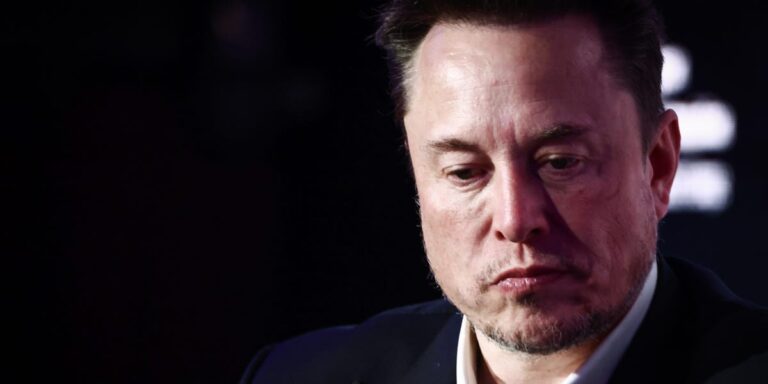- On Tuesday, Tesla shares plunged after Q2 earnings revealed the electric vehicle maker again missed expectations.
- During the call, Elon Musk faced brief questions about resource allocation and the delayed Robotaxi project.
- Tesla’s CEO sometimes sounds defensive when responding — and there may be a reason.
Tesla on Tuesday had a less than impressive earnings report that revealed the electric vehicle maker once again fell short of investor expectations.
And Elon Musk might be a little nervous.
While the automaker had slightly better-than-expected revenue, Q2 earnings showed Tesla’s adjusted profit margin fell from 18.7% to 14.4% year-on-year, its free cash flow fell short of analysts’ expectations. by more than half a billion dollars, and earnings per share have fallen from 91 cents a year ago to 52 currently.
The billionaire Tesla CEO answered a series of questions from investors and analysts on a variety of topics, including the company’s declining revenue from car sales, continued delays to its Robotaxi project, and whether the company’s current strategy is to continue with limited-edition models rather than investing in large-scale production of lower-cost models.
“We’re going to make great products in the future, just like we’ve done in the past. That’s it,” Musk replied bluntly.
Among the most tense exchanges was when an analyst pressed Musk about reports that his artificial intelligence startup, xAI, had been poaching engineers from Tesla and that Musk had diverted GPUs destined for Tesla to xAI.
“How do you make allocation decisions among these different ventures, and how do you make sure that Tesla owners are doing it in a way that truly benefits them?” the analyst asked.
Musk appeared riled before responding to the news. GPU switching is “old stuff” and Tesla has been diverting those systems because it has no place to store them — but its fledgling company, xAI, has.
“I want to be clear that it’s in Tesla’s best interests, not against Tesla’s best interests,” Musk said.
Rather than reassuring investors that the company is in a strong position to bounce back, Musk’s comments during the call seemed to do the opposite. By the time he ended the call, Tesla shares were down more than 7% in after-hours trading.
Some analysts remain bullish on Tesla’s prospects, such as Gene Munster, managing partner at Deepwater Asset Management, who told CNBC that he believes Tesla is “on track” to become a $3 trillion market cap company in the next few years.
But Musk has reason to be concerned about the electric vehicle company’s current performance.
Tesla has faced a decline in buyer enthusiasm and, despite discounts that have eaten into the company’s profits, demand has been weak. While Musk has promised innovations like Robotaxi and low-cost models for widespread adoption, those visions have yet to come to fruition.
In Q2 earnings, Tesla reported a 7% decline in automotive revenue year-over-year, which contributed to the company’s lower profit.
Not to mention increasing competition around the world — such as China’s rapid expansion in the sector — which Musk acknowledged on the call is a major concern for the company.
“There are quite a few competing EVs that have come to market,” Musk said. “For the most part, they haven’t sold, but they’ve been discounting their EVs heavily, which makes it a little bit harder for Tesla.”
The complications are compounded by the company’s heavy investment in artificial intelligence, which CNBC reported has increased spending by 10% from last year to $2.27 billion, further shrinking the company’s margins.
Tesla’s Q2 numbers were the second straight quarter in which the company’s profits plunged, with Tesla’s margins the worst in five years, according to Reuters. The disappointing results came shortly after shareholders re-approved Musk’s massive, $46.8 billion pay package over 10 years.
Dan Coatsworth, investment analyst at AJ Bell, told Reuters that Tesla has now missed its revenue targets for four consecutive quarters, discouraging some investors despite Musk’s continued optimism about the company’s prospects.
“There’s a lot of talk about robotaxes, humanoid robots and autonomous driving, which provides an attractive narrative for investors but it doesn’t lose sight of the fact that this is potential wealth in the future, not the present,” Coatsworth said.
Tesla representatives did not immediately respond to Business Insider’s request for comment.


